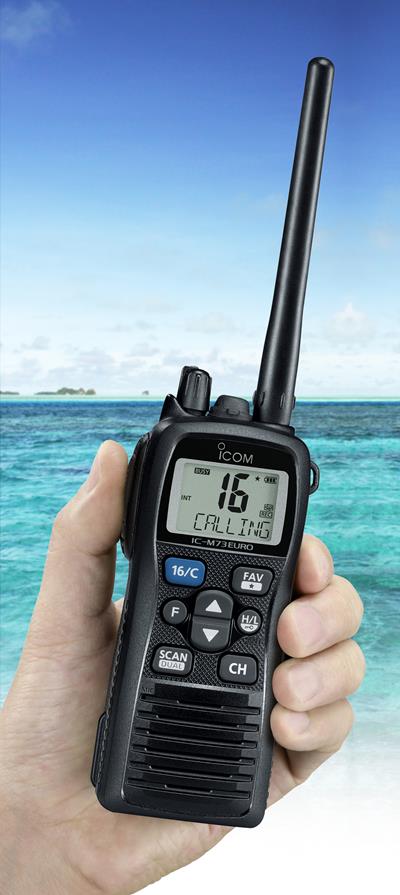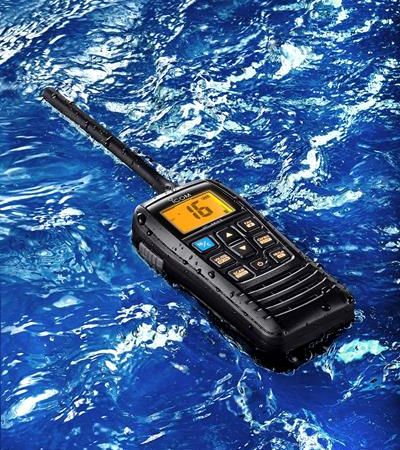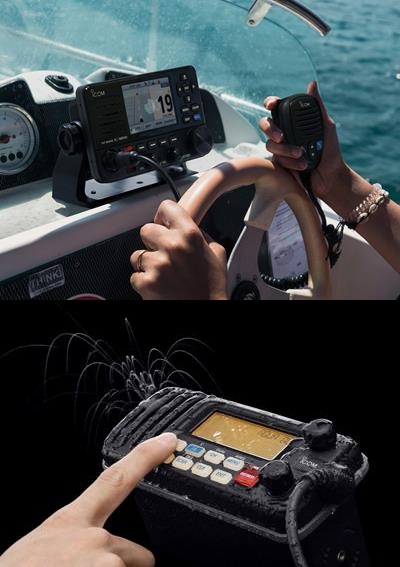What to consider when choosing a VHF Marine radio

Primarily you need it to communicate for safety with the coastguard and other boats and ships. What types of Marine VHF radio are available?
There are handheld and fixed panel mount VHF marine radios. Handheld VHF's are small, portable and suitable for small vessels without their own battery source; or as emergency back-up for fixed radios or as personal radios for crew and use in tenders. Fixed panel-mount radios are permanent, fixed and ideal as the main radio. They offer greater range than a handheld because of their extra power, generally 25W and external antenna.
What Marine VHF Radio would be best for me?
Look at why you need a VHF radio. If you are a dinghy sailor, jet skier, sea kayaker or paddleboarder, space will be an issue and a buoyant waterproof handheld with a long battery life may be desirable for the day long sessions. A handheld should be straightforward to use under pressure with easy shortcuts, an intuitive user interface and simplicity of operation. A clear screen and a decent battery life are also important. A DSC Handheld radio will allow you to contact a similarly equipped craft directly by means of a unique MMSI number or to send a distress signal equipped with your identity and location by a simple press of the button. Moving onto cruiser’s and RIBS’s venturing further out to sea, a small budget fixed radio providing the extra range may be worth considering. A large motorboat or yacht sailing further offshore, like above, will need greater range so a fixed mount unit will be a better solution. A larger vessel may opt for dual station control with a remote handset. All yacht and motorboats should consider AIS, either receiver only or a class B transponder. All recent fixed-mount marine VHF radios have DSC calling capability, allowing you to alert other boats, ships and shore stations with the single press of a button. When connected to a GPS, these DSC capabilities include; position polling, a variety of group calling options. Some offer the ability to connect to a remote microphone and act as an inter-ship intercom system. Some radios also have automated fog horns that connect to an external hailer horn. Some have built-in hailers that act as a public address system. Fixed radios do require installation, including connection to a power source, VHF antenna and GPS. Although quite straightforward to a DIY enthusiast, help from an authorised marine electronic dealer may be needed. Think carefully before installing. If space is tight, a black box solution may enable you to install a high end radio out of sight, whilst still being able to control the set with a portable handset.What features do I need with a Marine VHF radio?

Most handheld VHF radios offer basic functionality. Others offer extras such as DSC. Higher end features are being developed and integrated in modern fixed and handheld units. It is important to bear in mind that in an emergency you want an easy to use radio that is easy to operate and control. 2. Waterproofing?
Don’t get confused with waterproof values. Submersible (IPX7) is much preferable to something that is only splash proof such as radios which are IPX4. 3. Buoyancy
One of the biggest developments of recent years has been buoyancy technology within handheld radios. So if by accident you drop the radio over the side, it will come to the surface so you can retrieve it. To aid retrieval, some handheld sets have strobe lighting so that they can be seen in the water. 4. ATIS Programmable?
If you are going abroad to the continent, make sure your radio set is ATIS programmable. This can be set up by your supplying dealer. 5. Dual / Tri Watch & Scan
The set you are looking at should have dual or tri watch for scanning between channels whilst monitoring channel 16 as well as a customisable scan function so you can monitor all the channels you need to without missing a call.
Other considerations to think about when choosing a Marine VHF radio

Power can be used to improve the quality of signal and to overcome some obstacles. Remember, more power out means more power in, giving shorter battery life for handhelds or non-recharging batteries. Always start with the lowest power setting and work up. On a fixed unit you should expect at least 25W (PEP) transmit power and on handheld units you should expect no lower than 5W(PEP).
*Some channels (Ch15, 75 & 76) operate on 1W only. This should automatically be selected by your radio. 2. Handheld Battery Life?
If you are worried about running your battery low, there are several things you can consider. A good Lithium Ion battery can provide radio usage for a typical day at sea. Alternatively a spare battery or battery case that holds disposable cells or perhaps a 12V lead may be used. 3. Active Noise Cancelling Technology
If you know that you will be operating in loud environments such as on a motor cruiser it may be worth considering a set with active noise cancelling technology. Some of the latest radios feature this noise cancelling technology that digitally removes background noise and transmits your voice clearly. Active Noise Cancelling also improves an incoming signal therefore increasing voice quality. 4. Last Call Voice Recording
If you find that you cruise/sail as part of a group or are involved with racing a last call voice recording function, available on some sets, automatically saves the last incoming calls for a small time. This is very useful when clarifying information, allowing you the option to listen again without getting the call repeated. 5. Do I need a licence to operate a Marine VHF radio?
The Marine Radio Short Range Certificate remains a legal requirement for the use of marine VHF. All radios require the user and the vessel to hold a relevant licence. The vessel's licence is like a car tax disc, but is also the key to obtaining an MMSI number, which will uniquely identify your vessel. The user requires a radio 'driving licence' and two different types are available. For VHF only, the SRC (Short Range Certificate) instructs users in radio etiquette and procedures. VHF operation itself is fairly straightforward; however, the course also teaches you about digital selective calling (DSC) functions and emergency procedures. Further guidance about this subject can be found in our article 'Getting Your Marine VHF Licence'.
Before you buy a Marine VHF Radio, check!
1. Accessories?If you are purchasing a Handheld VHF, the radio should come as standard with charger, battery, belt clip and antenna. But if you are a serious user or semi commercial user you may want to see if the radio you are buying has the necessary accessories available to help you. Are there headsets, cases or speaker microphones available? 2. Warranty & support?
A warranty is a guarantee of peace of mind, when you are purchasing a radio that the dealer and manufacturer can back up what they are saying in terms of product quality and build. Some manufacturers offer 3 year warranty. For information about ICOM marine radios, visit the marine radio pages on our website.

